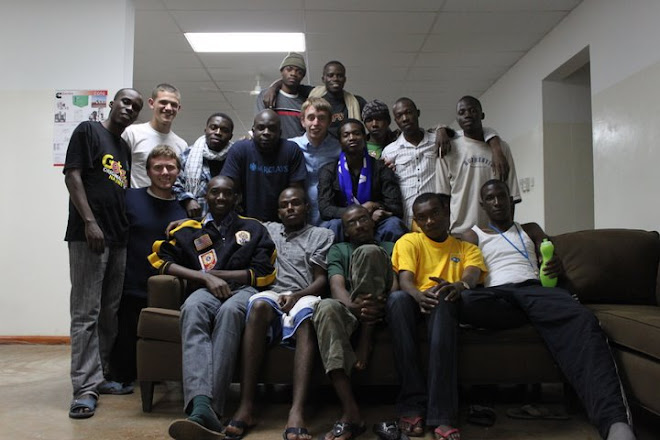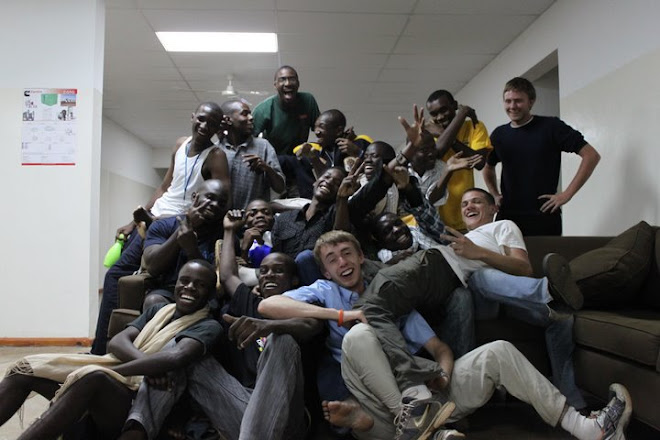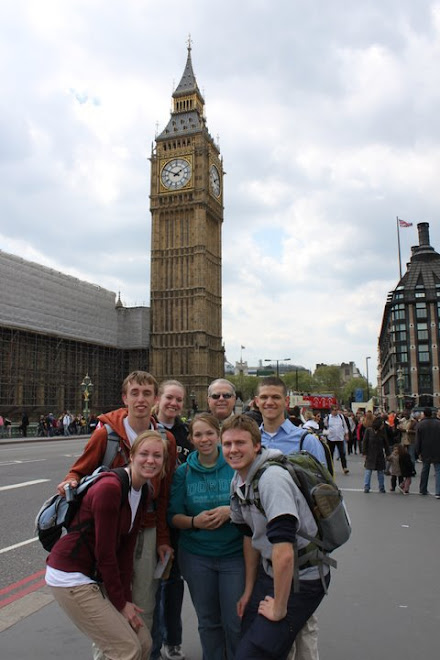Saturday, June 26, 2010
Lessons in Farming Thursday, May 20, 2010
I also forgot to mention that yesterday afternoon consisted of planting a small garden complete with a bucket drip irrigation kit. The plot will be used by Northrise to determine what grows well in Zambia and may be used in the future to aid locals when buying seed. Also, I was with Kafubu in the morning while the rest of the group was able to visit various classes at Northrise and experience Zambian teaching. They came away impressed with the classes as well as the student’s attentiveness and dedication for learning. As far as learning on a whole our group has determined that students at Dordt spend much more time out of class working on papers and assignments than students at Northrise. We are a little bit concerned for the five students that will be taking classes at Dordt in Fall 2011 and hope that classes at Dordt do not overwhelm them.
Ok, back to Thursday now…
This morning we went to a farm called the Dawn Trust Community Center. Besides providing a place of learning for kids they also farmed sustainably and showed local farmers how to practice the principle of Farming God’s Way. I am not an agriculture major, but I have learned a little bit about this principle after being in this class. Farming God’s Way is a sustainable farming technique that adds a spiritual component to farming. Instead of throwing more and more fertilizer onto the plants the practice (I believe) speaks of planting with a variety of plants that put various nutrients in the ground for each other. This is a much more balanced approach. There is also a special design for planting that involves a trench beside the lines, but I do not remember the exact layout. Additionally, There is a spiritual component of the farming aspect that relates well with Zambians because they believe there is a greater Being in everything they do (Zambia is a Christian nation, but everyone believes in spirits). Whether they call Him God or not is another question, but Farming God’s Way has this spiritual aspect that connects to the theological side of an individual.
Five principles that the community center taught were:
1. No burning. Burning brings carbon into the air, not in the soil where it belongs
2. Permanent Basins: These small basins would hold the nutrients in a small space for the plants year after year so that the plants of the next year could use the nutrients that the other plants put in the soil the previous year.
3. Early Land Preparation: Prepare the soil early, before you need to plant so that you give yourself enough time to do a good job.
4. Continuous weeding: As basic as it sounds, a lot of farmers do not practice this. Large weeds compete with growing plants for nutrients, water and sunlight.
5. Crop Rotation. Rotate the crops through the field in different years so that nutrients can be replenished and the soil does not become exhausted.
These five principles gave farmers more knowledge on how to grow their crops. Many of them have never heard ideas like this before and it is with knowledge like this that agriculture will grow in Zambia.
After the fieldtrip with Dr. Vos’ class we ate lunch in the cafeteria again with the students. I was struck by a message on the whiteboard at the front of the multipurpose room. It had been used by the previous class and it read “But you can’t really care about something until you come to know about it.” The board was talking about justice and taking a stand but I believe that sentence can be taken in a broader context. I feel that way about the people of Zambia and their condition below the poverty line. Before this trip I did not know what this nation has to offer. After coming to know these people I have a respect for them and their culture. I have started to care about them and what will happen to them in their future. You could say my worldview has changed and that quote sums it up pretty well so I thought I would share that with you.
This afternoon we finished seeding our plot with the drip lines. We got it finished just as the sun set and were able to make it back to the dorms before the mosquitoes had the chance to begin feasting on us.
We had our last night tonight in the dorms and the guys all got together for pictures. That is when we took the ones that you may have seen earlier (now at the bottom of the blog) with the whole group. We also took a few shaking hands. See if you can spot the illusion. That is an example of how our trip has been—a bridging of cultures. We were very sad to see this of our trip come to an end
Wednesday, June 23, 2010
Faith, Culture, Values. Wednesday, May 19, 2010
Wednesday morning I woke up to another example of how spiritual the Zambians are. I wandered over to the sink shortly after waking up and heard the hymn “How Great Thou Art” coming from a nearby shower. I was filled with joy just from hearing those lyrics and was enriched by someone praising the Lord to start the day.
Another example of how Zambians are more open about their faith occurred later that day. I was touring additional facilities that day with Kafubu and the engineer I was with asked me if I went to church back home. I explained to him my CRC back ground and he shared his Pentecostal faith and how he had journeyed in his walk with the Lord. Additionally, the engineer also gave me some knowledge about Ndola’s church diversity. The top three churches in Ndola are the Roman Catholic, United Church of Zambia (UCZ) and Penecostal Church. He mentioned that the Pentecostal church received some negative response when it first started in the 1980’s but has been doing better as people have become accepting of it as it has grown.
As I mentioned earlier, I visited several Kafubu sites today as well. They were both collection stations for bore holes. (Pipes coming from an underground water source.) I was fascinated to hear that the 10-11 bore holes average 160 meters cubed/hour of flow, with the top one rated at 224 meters cubed/hour. As with the station we visited yesterday, this one too had minimal additives. They only added one kilogram of chlorine per hour. I was again impressed by the cleanliness of the water that Kafubu was taking out of the ground.
The bore holes were about thirty minutes drive out of the city of Ndola and provided a look into a side of Zambia that I had not seen yet. We drove into an area that was not serviced by bus. As a result, there were people all the way along the road walking or biking to town. We passed many people and picked up a few along the way. At one point we had eight people and two bikes in the back of the pickup truck. We picked up four students in blue uniforms on their way to school. I found out they were in grade ten and enjoying school. When we were dropping the girls off a man from the side of the road started asking me questions like where I was from, what I was doing in Africa etc. I told him I was a student from Canada. He wanted me to take the school girls with me back to Canada. He then started speaking Bimbe, the local language in Ndola, and the driver translated for me after he had finished. The driver told me that this fellow saw that I had a blue shirt on that was similar to the one the girls had for their uniform. He was saying that if I was able to come all the way from Canada for a trip the girls should be able to do the same trip backwards and go to North America.
This was the same line of thinking that I had received from one of the girls when I had asked her what she wanted to do with her life. She had replied, “I want to be somebody.” That sentence stuck with me all day. The girl does not feel satisfied in this culture and wants to get out and do something with her life that means something. She seemed to feel insignificant and unvalued as a Zambian. This worldview frustrated me. She DOES matter! She is a child of God that has gifts and talents that she can use to serve the Kingdom. I could not understand why she did not feel fulfilled in Zambia and how being in America or just leaving Zambia would help her. This view that America is better than Africa in every respect is a perspective I heard all too often from Zambians and an idea that I struggled with throughout the trip. There are many people trying to drop everything African in their pursuit to become more American. The Zambians have such a unique culture that I hope they do not desert it in an attempt to become more prosperous. It is not worth it! They would lose a lot of their heritage in their effort to become more western and I hope they learn to value their culture, country, and history.
The driver also said that I had inspired the girls to study hard. This was a comment that I did not understand. Why am I an inspiration to people because of the colour of my skin? Is it just because of the wealth? I do not understand the impact that I apparently had on those people. I told the driver I did not want to be treated as a celebrity. I wanted to be another civilian, akin to one of them. No special treatment. However, the driver said I needed to make the most of it. He said that when I smile and wave to the children that I probably made their day and that my friendliness towards them would not soon be forgotten. I do not want to be treated specially by these people. I do not like social classes. I wanted to bridge cultures and bring knowledge to the people, not be celebrated like a celebrity. This is one reason that the words of our friend in the dorm meant so much to us three North American guys. When he said that the dormitory guys saw us as Zambians and not tourists we felt like we were connecting to them and were not just outsiders taking pictures. Overall, it was a wonderful morning where I felt like I experienced more of Zambia as well as the people that form the culture.
I came back to the campus at lunch time and had a wonderful meal of (you guessed it) Nshima. There was a lot of friendly conversation similar to the bus rides. (An interesting side note: That morning I had to take the bus as the only North American student and felt totally comfortable. I was encouraged that there was no nervousness and really felt that I was among friends.) I learned that Zambia has 500 tribes that use 72 different languages. Apparently there are subtle differences in language among tribes that speak the same language but you can understand it if you know the language. I was surprised to learn how unified the people are under the Zambian flag. Even though there are many different tribes they all work together as one nation. This has occurred much to the credit of the first president of Zambia who wanted all of Zambians to unite as One Tribe, One Nation.
Later that night I helped make supper which was composed of nshima, fish and relish. It was highly complimented by the guys although they were hungry by the time we finished at 10 o’clock. (Zambians usually eat later in the evenings like 8 or 9 o’clock but we were definitely pushing the limits.)
After supper one of the guys was showing me some of his Zambian music. He was describing some of the lyrics and I found them to be very inspirational. Instead of talking about sex and treating others poorly there were songs about HIV Aids, being careful with how you live your life, and respecting women for who they were. This was a polar opposite from what one would hear on the radio in North America and I was impressed by the lyrics.
Today I both discouraged and impressed by the people of Zambia. I was discouraged that they feel inadequate and want to be more western instead of embracing their own culture. However, I was encouraged by their music lyrics and the values that Zambians have in which Faith tops the list. My hope is that Zambia continues to build on its culture as it ages as a country. I also hope that as North Americans we learn from cultures such as Zambia that put faith and values such as friendship at the center of their lives. This day challenged me on what I believe, and forced me to ask the question “Which values are the center of my life?”
I want to ask anyone following the same question. What are your values? If someone were to meet you for a short time would they recognize these values in you? What culture do you live? Are you living in the world but not being of the wind? Today’s events challenged me on these questions and I wanted you to think through a few similar questions. Smell what I’m stepping in? Think. Reflect. Praise the Lord our Maker who gave us a free will to praise Him and proclaim the Good News to the world!!
Soli Deo Gloria
Monday, June 14, 2010
Stewards of Water and Land Tuesday, May 18, 2010
When we actually started I was quite encouraged by what we found. The tour started with a pilot project that Kafubu had started. It involved building 317 latrines for a compound. (The compound was built in 1940 for single men. Since then entire families have moved in and the old infrastructure is old and full of garbage.) Kafubu has taken on the project to build the toilets with the community’s input all the way along the project.
The fact that the community is involved in every aspect in the project is the most inspiring part of the project. In the book we studied for this class (When Helping Hurts) it was mentioned that in order to have development projects work the community needs to be involved from the beginning. The project started with a community participation assessment. It was at this meeting that the community decided they wanted squat toilets instead of flush because they did not want to pay for cleaning supplies. As a North American I thought this would be a backwards step in development, but it is another example of how Africa is not North America and different concepts work there. Other decisions made included how work roles would be divided among the two genders. The women of the community iterated that they could do the same work as the men. Sure enough, when we saw a few of the people working on a trench there were women digging as well as men. This is contrary to Zambian custom as women traditionally work in the home and do the laundry. This is still VERY accepted today, even from the guys we spoke to in the dorm later that day. Men often did the outdoor work and physical labour while women handle cooking, cleaning, and laundry. The fact that Kafubu discussed different strategies with the community instead of implementing what they thought was right was another example of how the company was community oriented.
In short:
They had a community meeting where the community voted on different aspects of their project (photos included for those who couldn’t read).
50 members were hired by Kafubu to perform much of the physical labour. (This encourages the community to take ownership of the project.)
The individual houses had to pay for a portion of the toilet. (Again, taking ownership of the project.) The other supporters included World Bank, the EU, and the Zambian Government Development Agency.
Kafubu had a social work group create workshops and lectures about the toilets in order to show them how they worked and how to take care of them. Included in these workshops were skits (provided by trained local talent) giving a more comedic style of things not to do. (Don’t throw stones or sticks in the toilet.) This knowledge is very important because training the community translates in a project that will be treated well and will last for a long time.
At the end of the project, Kafubu will hand responsibility over to a committee of six elected community members who will run, maintain, and manage the project including billing. These are all examples of how the community is involved in every step of this project. The idea of community involvement is straight from our book so to see it all in action was very encouraging!
The system was composed of two pipes that ran the length of the compound and connected to a brick dome. The dome was higher on one side than the other, so the feces flowed down (although it took a couple of hours) while bacteria eat away at the particles and create methane gas. The gas collected at the top of the dome and was then piped off for cooking. The excrement then linked with an existing pipe where it was brought to a facility that took the moisture out (with vegetation) and came out dry for use as compost. This is an incredible example of how a company can perform a project correctly and as a civil engineering major I was really intrigued with how they were making such a difference with appropriate technology.
I was also able to tour a couple of Kafubu’s water facilities and learned several facts about Ndola’s water supply. I was surprised to learn that they did not add any chemicals to their water except for a little chlorine to kill contaminants in the aging pipes. The water is pristine when it enters and leaves the pump house. Unfortunately the infrastructure has not been replaced since Britain was in power fifty years ago so their water is contaminated further down the lines. Growing up I always thought that Africa’s water was very contaminated but Kafubu showed me otherwise. They did mention that rural communities often have water problems because they dig their latrines too far down and their sewage ends up in the water table and that is what causes the health problems. Another interesting fact that one of the engineers told me was that Zambia contains 40% of Africa’s water. Much of this is underground in large aquifers and brought to the surface via bore holes. I was surprised by both the cleanliness and supply of water in Zambia and was glad for Kafubu’s willingness to tour me around their facilities. Even though they did not consider themselves a Christian company I saw evidence that they took the title of steward very seriously and as they did their part in caring for God’s creation.
We had lunch in the cafeteria with the students today. It consisted of Nshima of course (the national dish of Zambia that has the consistency of mashed potatoes except stickier and made from corn flour) as well as sausage for the meat component. It was nice to sit with the students and have small talk about school subjects and the weather and such. I was again surprised by the student’s cheerful, respectful and giving attitudes. The students are very willing to share and listen to you when engaged in a conversation. Another thing I noticed about Zambians was how less stressed out they are. That is something that I have realized more since being home. Everyone is so relaxed at Northrise University. This is in comparison with Dordt College, where it seems that meal times always surround papers needing finishing and assignments needing further calculations. It was a welcome change and one I could probably get used to.
In the afternoon our class had another “program” as the Northrise staff called it. We were brought to Baluba farms where western agriculture was practiced. The farm employed sixty Zambians meaning the farm generated a lot of produce as well as income for the surrounding villages. The farm was supported by a Danish church (or denomination...I’m not sure how many supported them) and run by a member of their church as well. The farm’s proceeds go to a local Bible College in order to reduce tuition for the students. The broiler chickens, dairy (where they had Fresian Holsteins!!), and hay all seemed a bit out of place in Africa. But, I did get my cow fill! (For those of you who do not already know...I like cows) The farm was unique because they were trying to breed different types of cows in order to get ones that did well in the sparse grazing conditions. The wide variety of cows made pictures interesting!
Another interesting piece of the farm was all of the machinery because this is not native to Zambia. The machinery is shipped from Denmark and one of the reasons the farm would not be feasible without the support of the church in Denmark. One of the odd machinery pieces was a round baler. There were round bales in the field as they had just finished the day before. The bales looked to be in juxtaposition with the banana trees in the field adjacent to them. It was like a bridging of two cultures...Iowa and Zambia. These two crops planted next to each other seemed to illustrate our trip well. We are two different cultures both trying to learn more about God’s gifts of food and agriculture as we discover how we can become better stewards of the creation that He has given us rule over.
Soli Deo Gloria
To God Alone be the Glory
Saturday, June 5, 2010
"Go Deep" Monday, May 17, 2010
Wednesday, June 2, 2010
Church Service and Good Conversation Sunday, May 16, 2010
For our Sunday morning church service we went with the Zimbas to Ndola Baptist Church. The service lasted 2 hours, which was expected as the Mexican and Dominican Republic services that I have visited in the past have occasionally been that long as well. I appreciated the sermon and songs being in English, which was different than Spanish in both Mexico and the Dominican Republic. The sermon was much easier to follow than those in Mexico and the Dominican although I think it related more to that particular church and their current circumstance than it did to us. It was really neat to share songs and praises with our brothers and sisters in Christ and know that 9 hours later our own physical families would be doing likewise in our home churches. I enjoyed seeing the body of Christ coming together and praising the same God on another continent!
Sunday afternoon and early evening were spent at Dr. Zimba’s house. We ate there and shared stories. Two of Northrise’s graduates were there and they shared a few of their life experiences as well. Topics discussed included our different views of time (monocratic vs. polychronic ), North American stereotypes, as well as teenage pregnancy. One of the interesting things our team learned about Zambian culture is that the women need to prove themselves to their future husbands. Many Zambian women believe they need to prove their fertility BEFORE they get married. Therefore they have premarital sex and often have one or two children before the y get married in order to prove to their man that they can produce more offspring for him. The two ladies we spoke to were of Christian back ground and did not believe this but instead shared our view and were saddened by the view of their fellow Zambians.
We got back to the dormitory at about 9 that night but did not get to bed until much later than that due to excellent conversation. The three Dordt guys were joined by about ten Northrise guys as we talked about dating and different traditions in our respective cultures. We enjoyed hearing their stories because they have a much different way of having relationships. Dating is taboo. With this being said it is accepted that everyone does it anyway, you just do not speak of it. The guys said that if you are visiting a girl and you hear that her parents are coming home you run out of there as fast as you can. Zambian guys have a different type of respect for Fathers than North Americans do. We spoke of developing a relationship of trust with a future Father in Law and including him in the process by asking him for permission to date and marry his daughter. The Zambians have a respect for the Father by way of fear. If one was not to fear the future Father in Law it would be disrespectful and rude. Also, if a Zambian guy is to get married they must tell their entire story to an uncle. After hearing the entire story the uncle arranges a rendezvous with the prospective girl’s uncle. At the rendezvous the man must present a dowry. The uncle moderates everything including the discussion between the two families. If the discussion goes well and the dowry is large enough the two young people are allowed to get married. Another interesting note towards marriage is that it includes the entire family. The entire extended family is also attached in this marriage. If there is a fight in the future with the couple the entire family helps work it through. For this reason there are not many divorces in Zambia. The families help each other sort out their problems. I thought this was a respectable way to go about this process and think maybe the North American culture could adopt a few of these practices in order to lower the divorce rate that seems to keep escalating.
Additionally, the North American guys found out a few interesting facts about how our culture is represented around the world. The Zambian guys were telling us how they view America. It turns out they get their impressions from the movies. Unfortunately, this paints a sad picture of our society. A few of them expressed concern with ever coming to the States as they would be putting their lives in danger from all of the crime and shooting. Also, the drugs, sex, and self image were also ideals that they did not agree with and thought were prevalent in ever day life. Now I know this is true for many parts of America I do not think these problems are prevalent in Sioux Center where they would be visiting if they came to Dordt College. Another thought we had to correct was that all girls look like they do in the movies and TV shows. The guys were adamant that North American girls must keep themselves looking good for the boys all the time with plenty of makeup and fancy clothes. As North American guys we were ashamed and apologized several times for this view. What was even scarier was how Zambians were getting educated on how to be American so that they might succeed in life. Many teens were wearing blue jeans (A very American way to dress) to show how Western they were as well as their elite status. We found it sad to see their society plunging into this fake ideal while losing so much of their own culture in the process. A few students expressed sadness that their culture was turning out this way and we shared in their disappointment.
Today was a huge day as far as conversation goes. As a team we really opened up with the students and expressed a lot more about how we live as well as learned incredible amounts about how the Northrise students live. Personally, I learned a lot about the Zambian culture as well as myself. These conversations challenged me individually about how I represent myself. These representations include how North American I act, but also how I represent Christ in all that I do. People are watching. How are you living in your everyday life? These conversations challenged me to wear Christianity on my sleeve so that the fact that I am Christian is as clearly communicated to my neighbour as my skin colour communicates wealth and happiness to the Zambian people.
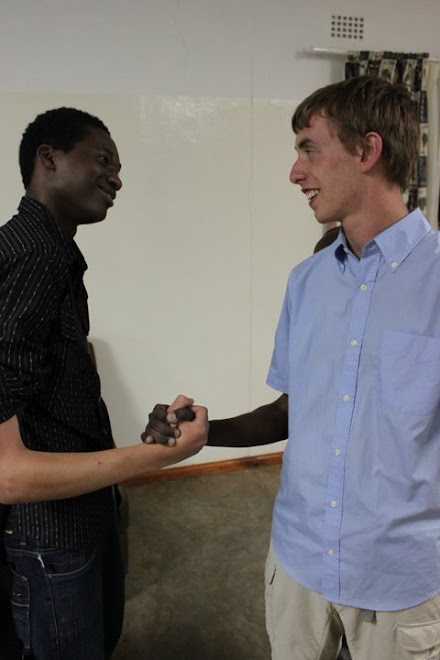
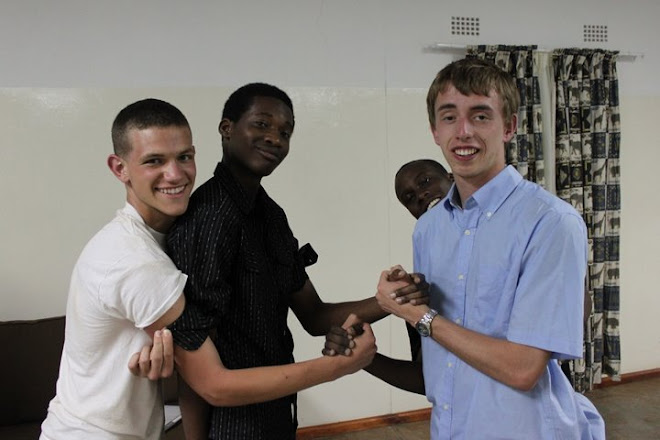
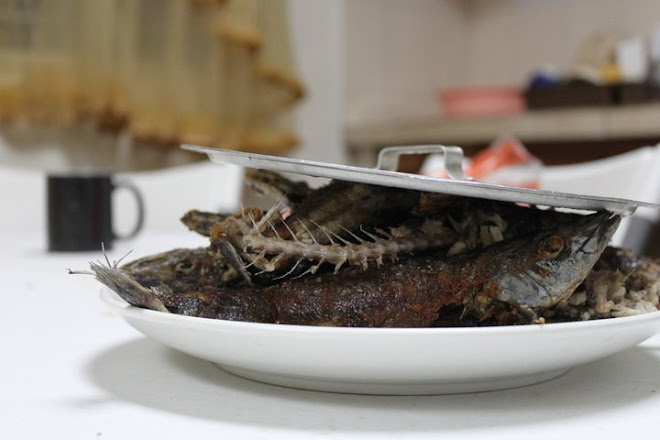
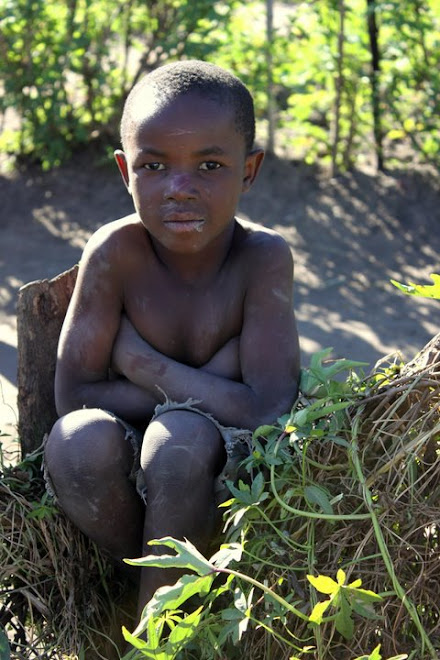
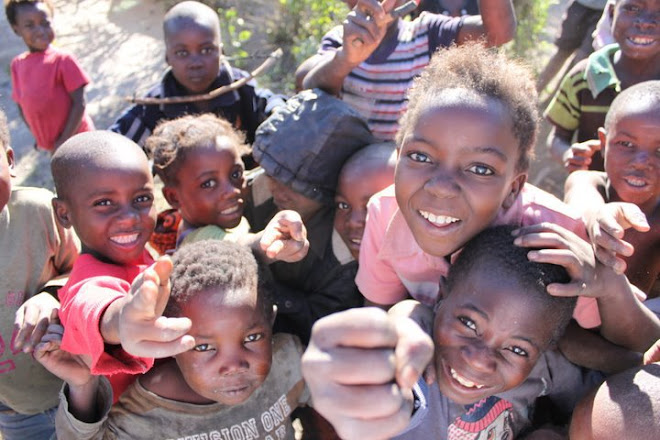
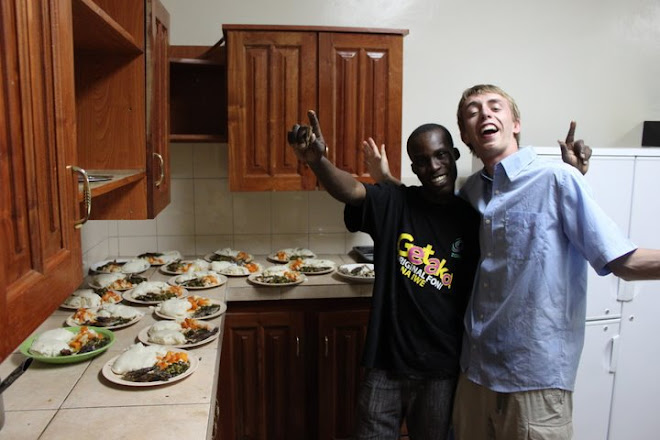.jpg)
